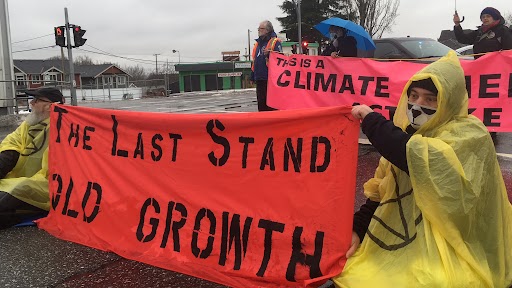A class-action lawsuit is being considered by a group to prevent protests against old growth logging through road blockades that are slated to run tomorrow.
Organizers of the Clear the Road campaign are gathering information to see if it is a viable option for their mission. An organizer Tamara Meggitt says anyone harmed by the disruptions taking place after Monday is asked to document and submit information.
“Are you a tradesperson who lost work? Were you unable to tend to your store? Did merchandise being delivered spoil or fail to reach its destination, causing your business a loss?” asks Meggitt in a press release. “If any of these things apply, we would like to hear from you.”
This follows the news that a logging protest group called Save Old Growth will be running blockades on Monday to, as they say on their website, “disrupt business as usual.”
The group aligns themselves with the A22 Network, which they say is a nine country coalition that has a distinct policy demand from governments in each. The Canadian chapter’s demand is that BC Premier Horgan pass legislation to immediately end all logging of old growth forests in the province.
Save Old Growth has run blockades and other protests in cities across the province since January of this year. On the island their presence has been felt most in the south-central in Nanaimo with weekly blockades and occasionally in Langford delaying traffic heading up-island from Victoria. They have local chapters in Nanaimo, Victoria, and Vancouver that meet weekly.
Most recently their supporters glued themselves to goalposts during Friday’s soccer match at BC Place between Canada and Caracao. They disrupted the game for a couple of minutes before play returned.
June 13th has been marked on the organization’s calendar for a while. On their website, they say that from June 13th on they are planning to occupy critical infrastructure “day after day until we get legislative change to ban all old-growth logging in BC.”
Meggitt says that Save Old Growth is purely a nuisance campaign.
“British Columbia already has world-leading standards in place for protecting rare ecosystems,” says Meggitt. “It isn’t environmentalism to block roads and force hundreds of drivers to burn extra fuel idling in an artificial traffic jam. That’s hypocrisy, and has a real impact on people’s lives.”
She asks anyone stalled in traffic by a blockade to document the “harm they suffer” and share that with Clear The Road by email at [email protected].
“Evidence of damages is necessary so we can work with a law firm to get a class-action lawsuit underway,” says Meggitt.
She hopes the protest will be a peaceful deterrent to protesters.
“These blockaders state they wish to provoke and anger the public to create physical conflicts that are then filmed for viral videos. What a horribly misguided idea,” says Meggitt. “We also hope a class-action suit can provide a peaceful release valve for the frustration caused to folks just going about their day.”






